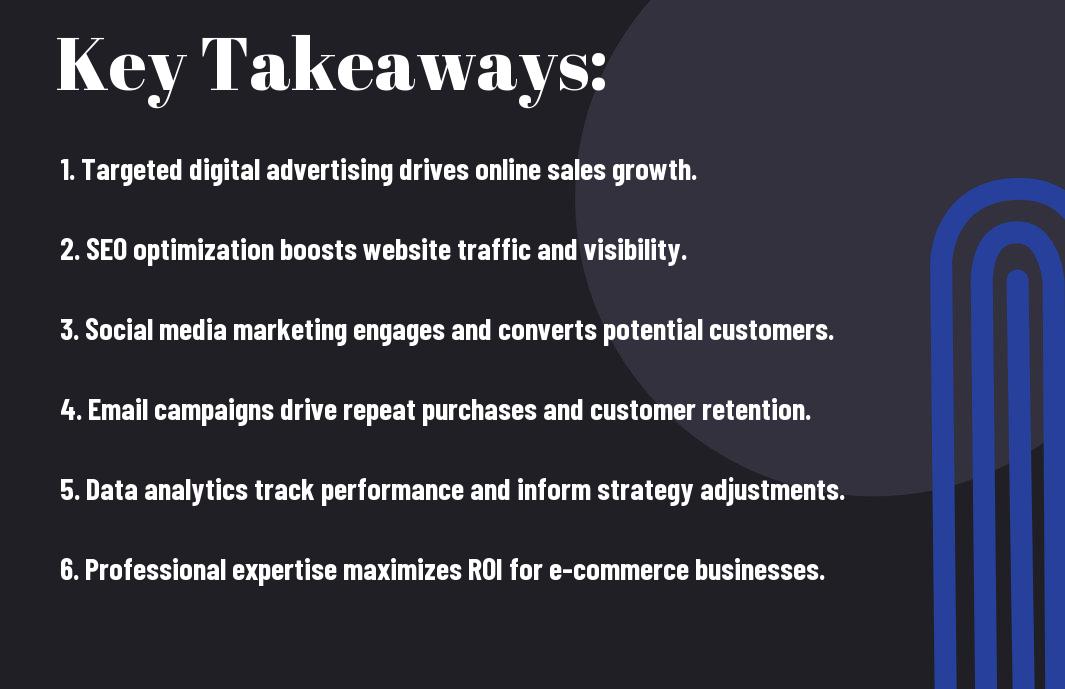
With the right e-commerce marketing services at your disposal, you can build brand awareness, establish credibility, and ultimately drive revenue for your online store. However, it’s important to choose a partner that can develop a customized strategy tailored to your business goals and target audience.







E-commerce marketing services are essential for US businesses looking to expand their online presence and increase sales.









An effective social media marketing strategy can help US businesses engage with their target audience and enhance brand awareness.








Donec responsive full width background slider nec magna eget purus faucibus iaculis. Vivamus in dictum turpis, quis dictum nunc. Aenean vel ullamcorper metus, quis feugiat purus.






rate
media
Marketing




Table of Contents
ToggleKey Takeaways:
- E-commerce marketing services are essential for US businesses looking to expand their online presence and increase sales.
- Successful e-commerce marketing involves targeted advertising to reach potential customers and drive traffic to the business’s website.
- Utilizing search engine optimization (SEO) techniques can improve a company’s visibility in online search results and attract organic traffic.
- An effective social media marketing strategy can help US businesses engage with their target audience and enhance brand awareness.
- Email marketing is an important tool for US businesses to nurture leads, maintain customer relationships, and drive repeat sales.
- Implementing conversion rate optimization techniques can improve a business’s website performance and increase the likelihood of visitors making a purchase.
- Partnering with a reputable e-commerce marketing agency can provide US businesses with the expertise and resources needed to achieve their online marketing goals.

Understanding the E-commerce Landscape
Obviously, the e-commerce landscape has undergone significant changes in recent years. With the increasing use of digital technology, consumers are now more inclined to shop online than ever before. As a US business owner, it is crucial for you to understand the e-commerce landscape and stay updated on current trends in order to effectively market your products and services.Current Trends in US E-commerce
One of the most significant trends in US e-commerce is the rapid growth of mobile shopping. As more and more consumers turn to their smartphones and tablets to make purchases, it is essential for you to optimize your e-commerce website for mobile devices. Additionally, the rise of social media as a shopping platform has also played a major role in shaping the e-commerce landscape. With platforms like Instagram and Facebook offering shopping features, it is important for you to utilize social media as part of your marketing strategy. Another trend to be aware of is the increasing popularity of subscription-based services. Many US consumers are now opting for subscription boxes and services, creating a new opportunity for businesses to market their products in a unique way. Lastly, the use of artificial intelligence and machine learning in e-commerce has also significantly impacted the way businesses market their products and engage with customers.The Role of Marketing in E-commerce Success
When it comes to e-commerce success, marketing plays a crucial role in attracting customers and driving sales. Effective marketing strategies can help you reach your target audience, build brand awareness, and ultimately increase your revenue. With the fierce competition in the e-commerce landscape, it is important for you to stay on top of marketing trends and utilize various channels such as email marketing, social media advertising, and search engine optimization to promote your business. Your ability to provide a seamless and personalized shopping experience for your customers will also heavily rely on your marketing efforts. By utilizing data and analytics, you can gain valuable insights into your customers’ behavior and preferences, allowing you to tailor your marketing strategies for maximum effectiveness. As you navigate the e-commerce landscape, it is essential to understand the current trends and the pivotal role of marketing in driving your business’s success. By staying informed and adapting your strategies accordingly, you can position your business for growth and maximize its potential in the competitive e-commerce industry.Building an E-commerce Marketing Strategy
Not having a solid e-commerce marketing strategy in place can lead to missed opportunities and inefficient use of resources. To ensure the success of your online business, it’s essential to develop a comprehensive marketing plan tailored to your specific goals and target audience.Defining Your Target Audience
When it comes to e-commerce marketing, knowing your target audience is crucial. You need to understand the demographic, psychographic, and behavioral characteristics of the people who are most likely to buy your products. This involves researching and analyzing data to gain insights into who your potential customers are, what they are interested in, and where they spend their time online. By truly understanding your target audience, you can tailor your marketing efforts to address their needs and preferences, ultimately increasing the effectiveness of your campaigns.Crafting a Unique Value Proposition
Another important aspect of building an e-commerce marketing strategy is crafting a unique value proposition. What sets you apart from your competitors? Why should potential customers choose to buy from your online store? Your value proposition should clearly communicate the benefits of your products or services, and how they fulfill the needs or desires of your target audience. By highlighting the unique value you offer, you can differentiate yourself in a crowded marketplace and attract customers who resonate with your brand. Additionally, your unique value proposition should be clear and compelling, effectively communicating the benefits of buying from your online store. It should be the central message that runs through all your e-commerce marketing efforts and should be reinforced at every touchpoint with your customers.Essential E-commerce Marketing Services
Your e-commerce business requires a range of marketing services to effectively reach and engage with your target audience. Implementing these essential e-commerce marketing services will help you elevate your online presence, drive traffic to your website, and ultimately increase sales and revenue.Search Engine Optimization (SEO) for E-commerce
Search Engine Optimization (SEO) is a critical component of e-commerce marketing. By optimizing your website and product pages for search engines, you can improve your organic search visibility and drive more qualified traffic to your site. Effective SEO involves keyword research, on-page optimization, technical SEO, and link building. It’s important to ensure that your e-commerce site is optimized for both desktop and mobile devices, as mobile-friendly websites are favored by search engines. Investing in a robust SEO strategy will help you rank higher in search engine results pages (SERPs), increase your online visibility, and attract potential customers to your website. Furthermore, SEO is an ongoing process that requires continuous monitoring and refinement. Regularly analyzing your website’s performance and making necessary adjustments based on search engine algorithm updates and user behavior is crucial for maintaining and improving your search rankings. By staying ahead of the competition and keeping your website optimized for SEO, you can consistently drive organic traffic and attract high-quality leads to your e-commerce business.Pay-Per-Click (PPC) Advertising
Pay-Per-Click (PPC) advertising is another essential e-commerce marketing service that can effectively promote your products and drive immediate traffic to your website. With PPC, you can create targeted ads that appear in search engine results and on various online platforms, paying only when a user clicks on your ad. This allows for precise audience targeting and immediate visibility for your e-commerce business. When implemented strategically, PPC advertising can yield a high return on investment (ROI) by reaching potential customers who are actively searching for products that your e-commerce business offers. By utilizing PPC advertising, you can increase brand awareness, generate leads, and boost sales in a short timeframe. Additionally, PPC provides valuable insights into consumer behavior and allows for real-time performance tracking, enabling you to optimize your campaigns for maximum effectiveness.Leveraging Social Media for E-commerce
Not taking advantage of social media for your e-commerce business is a missed opportunity. With nearly 80% of Americans using social media, it’s crucial for your business to have a strong presence on platforms like Facebook, Instagram, and Twitter. Social media can be a powerful tool for reaching potential customers, engaging with your audience, and driving sales.Social Media Marketing Strategies
When it comes to social media marketing for e-commerce, it’s important to have a well-thought-out strategy. You should identify your target audience, choose the right social media platforms, and create a content calendar to ensure consistent posting. Engaging with your audience is key, so make sure to respond to comments, messages, and reviews in a timely manner. You can also use paid advertising to reach a broader audience and drive traffic to your e-commerce website. Another important aspect of social media marketing is utilizing user-generated content. Encouraging your customers to share their experiences with your products can help build trust and credibility. You can also run contests and giveaways to increase engagement and attract new followers.Influencer Marketing and Partnerships
Partnering with influencers and other brands can be a game-changer for your e-commerce business. By collaborating with influencers who have a large and engaged following, you can reach a wider audience and build credibility for your brand. Look for influencers whose values align with your brand and whose followers match your target demographic. Be cautious when choosing influencers and ensure that their engagement and following are genuine. In addition to influencers, consider forming partnerships with other businesses or organizations that complement your products. This can help you tap into new markets and reach a wider audience. Collaborating with others can also open up opportunities for cross-promotion and co-branded marketing efforts.Email Marketing for E-commerce
To effectively promote your e-commerce business, email marketing is an essential tool that enables you to reach out to your customers and potential leads. By leveraging email marketing, you can build brand awareness, drive traffic to your website, and increase sales. In this chapter, we will explore the best practices for implementing email marketing for your e-commerce business, including creating effective email campaigns and segmenting your email list for targeted messaging.Creating Effective Email Campaigns
When it comes to creating effective email campaigns for your e-commerce business, it’s essential to focus on delivering valuable and relevant content to your subscribers. Personalization is key, as it helps to enhance engagement and drive conversions. You can achieve this by addressing your subscribers by their names and tailoring the content to their preferences and behaviors. Additionally, make sure your emails are mobile responsive to ensure a seamless experience for your subscribers across all devices. Consider using captivating subject lines, compelling visuals, and clear call-to-action buttons to drive engagement and motivate your subscribers to take action. Remember to track the performance of your email campaigns and use the insights to optimize future campaigns for better results.Segmenting Your Email List for Targeted Messaging
Segmenting your email list allows you to divide your subscribers into specific groups based on their demographics, behaviors, or purchase history. This allows you to send targeted and personalized emails that are more relevant to each segment, ultimately improving engagement and conversion rates. By segmenting your list, you can send tailored product recommendations, promotions, and content that align with the interests and preferences of each segment. Furthermore, you can re-engage inactive subscribers and nurture leads with relevant content to move them further down the sales funnel. Utilizing segmentation effectively can lead to higher open rates, click-through rates, and ultimately, increased revenue for your e-commerce business.Content Marketing for E-commerce
Your e-commerce business needs an effective content marketing strategy to attract and retain customers. Content marketing involves creating and distributing valuable, relevant, and consistent content to drive profitable customer action. In the e-commerce industry, content marketing is essential for building brand awareness, driving traffic to your website, and ultimately increasing sales.Content Creation and Curation
When it comes to content marketing for your e-commerce business, creating and curating high-quality content is essential. This includes producing engaging blog posts, product descriptions, videos, infographics, and other visual content that resonates with your target audience. Your content should address the pain points of your customers, provide solutions to their problems, and showcase the unique value of your products or services. Additionally, curating content from industry influencers or partnering with content creators can help you expand your reach and build credibility.Content Promotion and Distribution
After creating valuable content, it’s important to focus on promoting and distributing it effectively. Utilize social media platforms, email marketing, and partnerships with other websites to reach a wider audience. Boost your organic reach by optimizing your content for search engines with relevant keywords and metadata. You can also consider investing in paid advertising to further amplify your message to targeted demographics. Distribution channels such as guest posting, collaboration with influencers, and affiliate marketing can help you strengthen your brand presence and drive traffic to your e-commerce site.
Conversion Rate Optimization (CRO)
Not all website visitors translate to customers, but with the right Conversion Rate Optimization (CRO) strategies, you can significantly increase the percentage of visitors who take desired actions on your website. CRO is the process of improving your website or landing page to increase the likelihood that visitors will complete a specific action, such as making a purchase, filling out a contact form, or signing up for a newsletter.Analyzing User Behavior
Understanding how users interact with your website is crucial for successful CRO. By analyzing user behavior, you can identify patterns, preferences, and pain points, allowing you to make informed decisions about how to optimize your website for better conversion rates. You can track user behavior through various tools such as heatmaps, session recordings, and click tracking. These insights will help you identify where users are dropping off on your site, which pages are not performing well, and which elements are causing confusion or frustration for your visitors. Furthermore, by analyzing user behavior, you can identify opportunities to enhance the user experience, such as simplifying the checkout process, improving navigation, or refining the layout and design of your website to make it more user-friendly. By addressing these critical aspects, you can effectively reduce bounce rates and increase the likelihood of conversions.A/B Testing and User Experience Improvements
In addition to analyzing user behavior, A/B testing and user experience improvements are fundamental to successful CRO. A/B testing involves comparing two versions of a webpage or element to determine which one performs better in terms of conversion rates. By testing different variations of your website, you can identify the most effective elements that drive conversions and make data-driven decisions about which changes to implement. Improving user experience is a continuous process that involves refining the design, content, and functionality of your website to create a seamless and intuitive experience for your visitors. This may include optimizing page load speed, streamlining the checkout process, and ensuring that your website is mobile-responsive. By implementing these improvements, you can enhance user satisfaction and ultimately boost conversion rates.
Analytics and Performance Measurement
Keep track of the performance of your e-commerce marketing efforts is crucial to the success of your business. Analytics and performance measurement allow you to understand what is working and what isn’t, so you can make informed decisions and optimize your strategies for the best results. In this chapter, we will explore the importance of key performance indicators (KPIs) for e-commerce and how utilizing analytics tools can help you track the success of your marketing initiatives.Key Performance Indicators (KPIs) for E-commerce
When it comes to e-commerce marketing, there are several key performance indicators (KPIs) that you should pay close attention to. These KPIs provide valuable insights into the effectiveness of your marketing efforts and can help you identify areas for improvement. Some of the most important KPIs for e-commerce include conversion rate, average order value, customer acquisition cost, and customer lifetime value. By keeping a close eye on these KPIs, you can gain a deeper understanding of how well your marketing tactics are performing. For example, a high customer acquisition cost coupled with a low customer lifetime value could indicate that you are spending too much to acquire customers who aren’t providing long-term value to your business. On the other hand, a high conversion rate and average order value may signal that your marketing strategies are effectively driving sales and increasing revenue.Utilizing Analytics Tools to Track Success
Utilizing analytics tools is essential for tracking the success of your e-commerce marketing efforts. These tools provide valuable data and insights that can help you make informed decisions about your marketing strategies. Google Analytics, for example, can give you detailed information about your website traffic, user behavior, and conversion rates. This information can help you identify which marketing tactics are driving the most traffic and conversions, allowing you to focus your efforts on what is working best for your business. Additionally, analytics tools can help you understand your audience better by providing demographic and psychographic information about your website visitors. This data can be used to create targeted marketing campaigns that resonate with your audience, leading to higher engagement and conversion rates. By utilizing analytics tools effectively, you can gain a deeper understanding of your e-commerce performance and make data-driven decisions to maximize your marketing ROI.Customer Relationship Management (CRM)
Now, let’s talk about customer relationship management (CRM) in the context of e-commerce marketing for your US business. CRM encompasses the strategies and technologies used to manage and analyze customer interactions and data throughout the customer lifecycle to ultimately improve business relationships with customers, assist in customer retention, and drive sales growth.Techniques to Retain Customers
Retaining customers is critical to the long-term success of your e-commerce business. One of the most effective techniques to retain customers is by providing exceptional customer service. When customers feel valued and appreciated, they are more likely to remain loyal to your brand. This means promptly addressing their concerns, providing informative and helpful communication, and going the extra mile to exceed their expectations. Another technique to retain customers is by personalizing their experience. Utilize customer data to understand their preferences, purchase history, and behavior to tailor your marketing efforts and product offerings. This makes customers feel understood and valued, ultimately increasing their loyalty to your brand.Loyalty Programs and Customer Engagement
Loyalty programs are a powerful tool for fostering customer engagement and incentivizing repeat purchases. By offering rewards, discounts, or exclusive perks to loyal customers, you can encourage them to continue doing business with you. This not only increases customer retention but also creates a sense of exclusivity and belonging, further solidifying their relationship with your brand. Engaging with your customers through various channels such as social media, email marketing, and personalized content also plays a crucial role in fostering loyalty. By staying connected and providing valuable information and offers, you can keep your brand top of mind and encourage repeat engagement and purchases. In implementing these strategies, remember that building and maintaining strong customer relationships takes time and effort, but the payoff in terms of long-term customer loyalty and increased sales is well worth it.Mobile Commerce (M-Commerce)
Unlike traditional e-commerce, mobile commerce (m-commerce) refers to the buying and selling of goods and services through wireless handheld devices such as smartphones and tablets. With the increasing prevalence of mobile devices, m-commerce has become an essential part of the e-commerce landscape. As a US business looking to expand your online presence, it’s crucial to understand the significance of m-commerce and how it can benefit your bottom line.The Growth of Mobile Shopping
In recent years, the growth of mobile shopping has been nothing short of astounding. With the convenience of mobile devices, more and more consumers are turning to their smartphones and tablets to make purchases. In fact, according to a study by Statista, mobile commerce sales in the US are projected to reach a staggering $432 billion by 2022. This indicates a significant shift in consumer behavior, with a preference for browsing and buying products on their mobile devices. Furthermore, the advent of mobile wallets and digital payment platforms has streamlined the checkout process, making it even easier for consumers to make purchases on the go. As a US business, it’s crucial to capitalize on this trend by optimizing your e-commerce site for mobile users and providing a seamless shopping experience.Optimizing for Mobile Users
When it comes to m-commerce, optimizing your website for mobile users is non-negotiable. This means ensuring that your site is responsive, with a mobile-friendly design and fast-loading pages. A smooth, intuitive user experience is paramount when it comes to mobile shopping, as any friction in the buying process can lead to abandoned carts and lost sales. Additionally, consider implementing mobile-specific features such as one-click purchasing, mobile-friendly payment options, and personalized recommendations based on users’ behavior. By providing a tailored experience for mobile users, you can increase engagement, conversions, and ultimately, revenue for your US business.Regulatory Compliance and Best Practices
For US businesses engaging in e-commerce, it is crucial to understand the regulatory compliance and best practices that govern online transactions. Failure to comply with these regulations can lead to severe legal consequences and damage to your business reputation. In this chapter, we will delve into the key aspects of regulatory compliance and best practices to ensure that your e-commerce operations are in line with the law.Understanding E-commerce Laws and Regulations
When running an e-commerce business in the US, you must navigate a complex web of laws and regulations that govern online transactions. This includes regulations related to consumer protection, payment processing, data privacy, and more. One of the most significant pieces of legislation that you need to be aware of is the Uniform Commercial Code (UCC), which sets out laws governing commercial transactions, including the sale of goods and electronic transactions. Additionally, you need to consider the Federal Trade Commission (FTC) Act, which prohibits unfair and deceptive practices in commerce, as well as state-level consumer protection laws that may apply to your business. It is essential to stay updated on any changes to these laws and regulations to ensure that your e-commerce operations remain compliant. Failure to do so can result in costly legal disputes, fines, and reputational damage for your business. Consulting with legal experts specializing in e-commerce law can help you navigate this complex landscape and ensure that you are operating within the bounds of the law.Privacy, Security, and Trust Building
Privacy and security are paramount for e-commerce businesses, as they handle sensitive customer information and financial transactions. To build trust with your customers, it is crucial to implement robust privacy and security measures to protect their data. This includes using secure payment gateways, encrypting customer data, and adhering to industry best practices for data protection. When you prioritize privacy and security, you demonstrate to your customers that you take their trust seriously, creating a positive reputation for your brand. By implementing transparency in your data handling practices and obtaining privacy certifications and compliance, you can reassure your customers that their information is safe with you, ultimately boosting their confidence in making online purchases from your business.Implementing E-commerce Marketing Services
Despite the increasing importance of effective e-commerce marketing in boosting sales and expanding your customer base, many US businesses struggle with implementing the right strategies to achieve their desired results. Fortunately, there are several approaches to implementing e-commerce marketing services, and choosing the right one for your business depends on various factors such as internal capabilities, budget, and desired outcomes.Internal Management vs. Outsourcing
When it comes to implementing e-commerce marketing services, you have the option to handle the tasks internally or outsource them to a specialized agency. Handling it internally allows you to maintain full control over the strategy and execution, but it also requires a significant investment in resources, time, and expertise. Outsourcing to a reputable e-commerce marketing agency, on the other hand, gives you access to a team of professionals with extensive experience in the field, saving you time and often resulting in a more effective marketing strategy. However, it’s important to carefully consider the trade-offs and make the decision that aligns with your business goals and resources.Choosing the Right E-commerce Marketing Agency
When it comes to choosing the right e-commerce marketing agency to partner with, there are several factors to consider. First and foremost, you should assess the agency’s track record and experience in successfully managing e-commerce marketing campaigns for businesses similar to yours. This involves examining case studies, client testimonials, and the overall reputation of the agency within the industry. Additionally, you should evaluate the specific services offered by the agency, ensuring they align with your business needs and goals. Finally, consider the agency’s approach to communication and reporting, as a transparent and collaborative relationship will be essential for the success of your e-commerce marketing efforts. Making an informed decision when choosing an e-commerce marketing agency is crucial to achieving your desired results and maximizing the return on your investment.Case Studies and Success Stories
Despite the challenges faced by many businesses in the highly competitive e-commerce market, there are several success stories that exemplify the potential and power of effective e-commerce marketing services. Here are some case studies that demonstrate the impact of strategic e-commerce marketing:- Case Study 1: XYZ Clothing saw a 150% increase in online sales within three months of implementing targeted social media advertising and email marketing campaigns. By leveraging user-generated content and incorporating influencer collaborations, XYZ Clothing was able to expand its customer base and enhance brand loyalty.
- Case Study 2: ABC Electronics achieved a 200% boost in website traffic by optimizing their product listings for search engines and investing in pay-per-click (PPC) advertising. The implementation of personalized recommendation algorithms led to a 30% increase in average order value, resulting in substantial revenue growth.
- Case Study 3: DEF Beauty utilized a multi-channel approach, combining engaging video content with targeted Google Ads campaigns. As a result, DEF Beauty experienced a 250% surge in online conversions and secured a significant market share in the beauty industry.
Analysis of Effective E-commerce Campaigns
When delving into the analysis of effective e-commerce campaigns, it is clear that certain strategic elements contribute to their success. Understanding your target audience, utilizing data-driven insights, and leveraging the latest digital marketing tools can significantly enhance the performance of your e-commerce initiatives. By focusing on user experience, refining your value proposition, and optimizing conversion funnels, you can maximize your e-commerce marketing efforts and achieve substantial growth in online sales. It is imperative to continuously monitor key performance indicators (KPIs) and adjust your strategies accordingly to ensure sustained success in the competitive e-commerce landscape.Learning from Challenges and Failures
Learning from challenges and failures is essential for the continual improvement of your e-commerce marketing endeavors. Whether it involves overcoming technical obstacles, adapting to shifts in consumer behavior, or addressing scalability issues, acknowledging and addressing failures is crucial to long-term success. Embracing a growth mindset and leveraging failure as a learning opportunity can lead to innovative breakthroughs and the development of resilient e-commerce strategies. By fostering a culture of experimentation, embracing agility, and seeking continuous feedback, you can effectively navigate challenges and propel your e-commerce business towards sustainable growth.Future of E-commerce Marketing
After experiencing rapid growth in recent years, the e-commerce industry is expected to continue to evolve and innovate in the coming years. As new technologies and consumer behaviors shape the landscape, businesses must stay ahead of the curve to remain competitive in the market.Emerging Technologies and Innovations
With the advancement of technology, e-commerce marketing is expected to be revolutionized by a variety of emerging technologies. These include artificial intelligence, virtual reality, and augmented reality, which are set to transform the way businesses interact with their customers. For example, AI-powered chatbots can provide personalized recommendations and support to customers, while virtual and augmented reality can offer immersive shopping experiences. By integrating these technologies into your e-commerce marketing strategy, you can provide your customers with an engaging and personalized shopping experience, ultimately driving higher conversion rates and customer satisfaction.Adapting to Changing Consumer Behaviors
As consumer behaviors continue to change, businesses must adapt their e-commerce marketing strategies to meet the evolving needs and preferences of their target audience. Today’s consumers expect seamless, personalized experiences across all touchpoints, from browsing products to post-purchase support. This means that businesses must prioritize omnichannel marketing, leveraging data and analytics to deliver relevant and timely messaging to their customers. Furthermore, with the rise of mobile shopping and social commerce, it’s crucial to optimize your e-commerce marketing efforts for these platforms to reach and engage with your audience effectively. By understanding and adapting to these changing behaviors, you can position your business for success in the future e-commerce landscape. By staying ahead of emerging technologies and understanding how consumer behaviors are evolving, you can prepare your e-commerce marketing strategy for the future. Embracing these changes will give you a competitive edge, allowing you to effectively reach and engage with your target audience while driving business growth.
